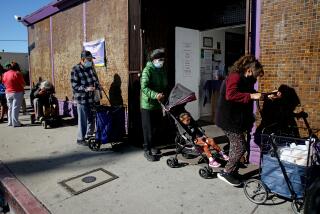$60-million state grant to aid L.A. County in expanding homeless services in Skid Row

- Share via
A $60-million state grant recently awarded to L.A. County’s Department of Health Services will jump-start a plan to provide interim housing and services for more than half of Skid Row’s homeless population over the next three years.
The grant, awarded on June 14, will be directed toward the Skid Row Action Plan, a $280-million initiative aimed at improving life in the downtrodden neighborhood by addressing the need for more interim and permanent housing, behavioral health and substance use treatment, among other services.
The county is contributing $125 million toward the effort and the city of Los Angeles is adding $40 million, while an estimated $55 million in vouchers will be leveraged from public housing authorities, according to a county statement.
The Encampment Resolution Fund grant from the California Interagency Council on Homelessness, part of the Business, Consumer Services and Housing Agency, is part of a $191-million grant that is being distributed to 22 communities to fund 23 projects that will help house 7,300 homeless people.
L.A. County Supervisor Hilda Solis, whose district includes Skid Row and proposed the Skid Row Action Plan last year, said in a statement that the state grant will ultimately save lives.
“As the heart of the overdose crisis, Skid Row residents deserve the dignity of housing where they can receive the care they need,” she said. “This action will help bring hundreds of people indoors quickly and support their path to recovery.”
Skid Row has long been plagued by poverty, drug addiction, homelessness and mental illness. The neighborhood is home to 4,402 homeless people, more than half of them unsheltered, according to the 2022 Greater Los Angeles Homeless Count.
Black people and Latinos make up a large portion of Skid Row’s population. At least 36% of the people experiencing homelessness in the neighborhood suffer from mental illness, 33% reported substance use disorder and 38% reported having experienced domestic violence. The neighborhood is also a hot spot for overdose deaths.
The state grant will allow the county, city and the Los Angeles Homeless Services Authority to provide hundreds of interim housing beds at multiple hotels and motels in and near the Skid Row area, as well as other locations.
County officials said the interim housing beds will help bring 2,500 homeless people indoors while an estimated 2,000 people will eventually be placed into permanent housing. The grant will also help expand services that will serve about 3,000 people.
The county also plans to create a “Safe Landing” facility in Skid Row that would be open 24/7 for people to access clinical services and other resources.
The interim housing and health center are part of the county’s Skid Row Action Plan that was developed last year in June.
The Housing for Health, a division of the county’s Department of Health Services, developed the plan with assistance from groups that included representatives from the city, county agencies and Skid Row community organizations including residents and businesses.
The collaboration led to a series of recommendations to improve life in Skid Row that include creating a drug user health hub where people can access drug treatment referrals, harm-reduction services as well as training in first aid, CPR and overdose reversal. The plan also recommends the county create a “Safe Services Space,” where people can charge phones, receive legal aid and apply for public health benefits.
Los Angeles Mayor Karen Bass, who has fostered a collaborative relationship between city and county agencies, said the grant and initiative are the result of everyone locking arms to address the homelessness crisis.
“By working together, we secured this funding, which will be instrumental in housing Angelenos living in Skid Row by bringing in critical interim housing resources,” Bass said. “We are facing a crisis in our city and Skid Row is the historic epicenter — but announcements like this show that we can make progress on this issue.”
More to Read
Sign up for Essential California
The most important California stories and recommendations in your inbox every morning.
You may occasionally receive promotional content from the Los Angeles Times.











